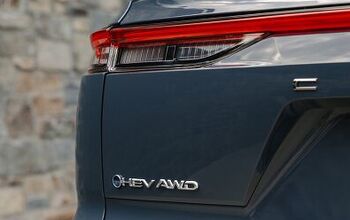Overall Vehicle Dependability Down Thanks to Newfangled Gizmos, Apparently

Perhaps we’ve finally hit a point where the old ways actually are the best. Gizmo-centric problems seem more important than ever to J.D. Power and Associates in this year’s dependability ranking, which examined problems experienced over the last 12 months on three-year-old vehicles and highlighted electronic accessories as a major issue.
So, a car that has a rock-solid drivetrain still might not make the grade due to a wonky multimedia system. A good example of this was J.D. Power’s chosen pickup, the Ford F-150. While the Ford achieved top marks for the quality of its interior, exterior, and electrics, the Toyota Tundra possessed vastly superior powertrain reliability.
It’s a similar story with the minivan segment. While the Toyota Sienna was given the crown, the Chrysler Town & Country actually had fewer reported problems in every area except the powertrain — and even that was still rated above average. It makes you wonder how much of the long-term quality being tested here is influenced by J.D. Power’s initial quality categories, which it splits into separate mechanical and “design” groups.
Meanwhile, Honda’s Ridgeline achieved an undisputed perfect dependability score in the midsize pickup segment and the Chevrolet Camaro walked away with an easy victory against the other American sport coupes.
Chevrolet’s Tahoe was rated best in reliability among larger SUVs and the Silverado HD won out in heavy-duty pickups. General Motors also faired well on the other end of the spectrum, with the Chevrolet Sonic emerging as the top-ranked small car.
GM should be generally pleased as its brands hovered around the upper-middle zone of reliability, with Buick in the top spot (or fourth place overall). It was beaten by Toyota, Porsche, and Lexus. In fact, Toyota and Lexus managed to place first in 10 of the 18 individual car segment categories. The Camry, Avalon, FJ Cruiser, Venza, Prius, and Prius V all scored big for Toyota while Lexus cleaned up the majority of the premium brackets.
J.D. Power populated the bottom of the pack with Infiniti, Ford, Mitsubishi, and all of the familiar FCA brands.
On average, owners of these 2014 models reported 156 issues per 100 cars in the past year. It’s an increase from last year’s survey and stems heavily from complicated multimedia control systems, says J.D. Power. Last year, 20 percent of the arising issues were attributed to electronic gremlins. This year it was two percent higher.
This 2017 U.S. Vehicle Dependability Study was based on responses given to J.D. Power & Associates from 35,186 original owners of vehicles from the 2014 model year after 3 years of ownership. The study was conducted from October through December of 2016. According to the surveyor, issues were categorized into the following areas: exterior, interior, the driving experience, seats, HVAC systems, controls/displays, engine/transmission, and audio/communications/entertainment/navigation equipment.
[Image: Ford Motor Company]

A staunch consumer advocate tracking industry trends and regulation. Before joining TTAC, Matt spent a decade working for marketing and research firms based in NYC. Clients included several of the world’s largest automakers, global tire brands, and aftermarket part suppliers. Dissatisfied with the corporate world and resentful of having to wear suits everyday, he pivoted to writing about cars. Since then, that man has become an ardent supporter of the right-to-repair movement, been interviewed on the auto industry by national radio broadcasts, driven more rental cars than anyone ever should, participated in amateur rallying events, and received the requisite minimum training as sanctioned by the SCCA. Handy with a wrench, Matt grew up surrounded by Detroit auto workers and managed to get a pizza delivery job before he was legally eligible. He later found himself driving box trucks through Manhattan, guaranteeing future sympathy for actual truckers. He continues to conduct research pertaining to the automotive sector as an independent contractor and has since moved back to his native Michigan, closer to where the cars are born. A contrarian, Matt claims to prefer understeer — stating that front and all-wheel drive vehicles cater best to his driving style.
More by Matt Posky
Latest Car Reviews
Read moreLatest Product Reviews
Read moreRecent Comments
- SCE to AUX Inflation adjusted $79k today (!), so I guess $28k is a bargain....This is another retro car that was trying too hard, but it is very nice.
- EngineerfromBaja_1990 It might provide an edge in city driving but from what I've read elsewhere the Hybrid trucks are 600 lbs to 700 lbs heavier than the gas only trucks. That translates to a curb weight of around 5000 lbs which is not uncommon for a full size truck.And a test drive suggested the Hybrid is not quicker than the gas only trucks. So it looks like the Hybrid powertrain is pretty much compensating in power for all that added weight while not providing significant fuel savings. Not what many would expect after shelling out an extra $5K - $7K for the next step up in power.
- Buickman DOA like no other!
- 3-On-The-Tree Yes anything offroad or high performance isn’t cheap. My oldest son would do occasional burnouts in his Mustang GT then he had to buy tires for it. Needless to say he doesn’t do burnouts anymore.
- Slavuta I recently was looking at some Toyota parts. I think this ebay user sells totally counterfeit Toyota parts. Check the negative reviews


































Comments
Join the conversation
" Perhaps we’ve finally hit a point where the old ways actually are the best ". Predictable but I and others of my kind were never invited to focus groups. Didn't meet the "change for the sake of change" criteria I guess. Dumb manufacturers, my cash recently went to a car that actually had normal tires instead of sidewall collapsing and rough riding run flats, together with an actual spare tire and jack. Also actual one step and you are done dials and buttons when adjusting things inside the car. Oh and actual real-with-my-own-eyes visibility all around the car, most of it anyway, not relying only on a camera and good luck. Who knew anyone would value these things? :(
What's the chances of the various electronic modules being available in 8 or 10 years? What incentive does a manufacturer have to produce them, long term, if they decide that not supporting them could lead to the sale of a new vehicle?